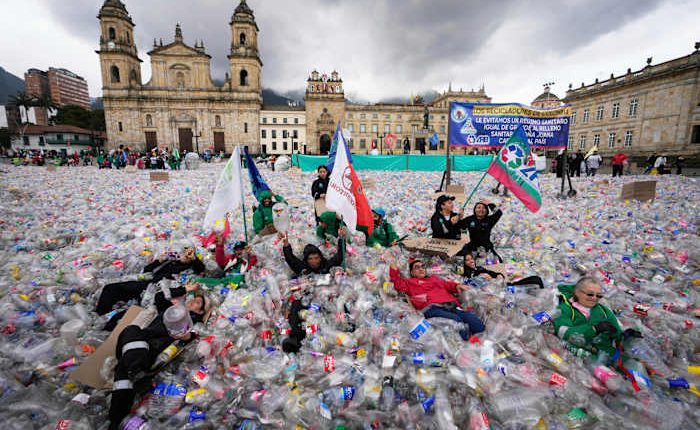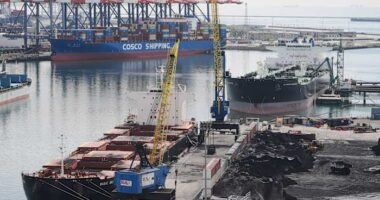Share this @internewscast.com

BOGOTA – In a demonstration against falling earnings and more challenging working conditions, numerous Colombian waste pickers filled Bogota’s notable Bolivar Square with roughly 15 tons of recyclable materials on Tuesday. These workers gather refuse from residences, industries, and offices, then sell it to regional recycling facilities.
The protest was coordinated by 14 waste picker organizations in Bogota, a metropolis where an estimated 20,000 scavengers toil for extensive hours collecting materials such as plastic bottles, scrap metals, and cardboard. Around 100 waste pickers participated, with some mimicking swimming through the heaps of trash.
“Factories need to compensate us fairly for the materials we gather,” expressed Nohra Padilla, head of Colombia’s National Association of Waste Pickers. “Colombians and their government must understand that without our contributions, landfills would be overwhelmed.”
Most waste pickers in Colombia work independently, pulling heavy carts and gathering recyclable items that are not collected by local garbage trucks. The trucks, which are run by contractors or municipal governments, focus on gathering organic and nonrecyclable trash.
The income of these waste pickers depends largely on how many kilos of plastic, cardboard or scrap metal they can sell every day to warehouses or local associations, which then sell the material to recycling plants.
Jorge Ospina, the president of the ARAUS waste pickers association, said that over the past two months the price his association gets paid by recycling plants for every kilogram of plastic fell from about 75 U.S. cents to 50 cents. He said he can only afford to pay waste pickers about 25 cents per kilo of plastic they drop off at the ARAUS warehouse in Bogota.
Ospina said imports of fresh plastic from countries including China could be behind the sharp drop in prices.
“We need more government regulation,” he said, warning that if prices fall further waste pickers might no longer be motivated to collect recyclable goods, and landfills in Colombia would “overflow.”
Colombia’s constitution protects waste pickers, who often come from impoverished backgrounds
These trash collectors are prioritized over large contractors when it comes to gathering recyclable goods and in large cities municipal governments are obliged to pay a monthly fee to waste pickers associations that varies in accordance with how many tons of trash each association collects.
But prices for recyclable trash are unstable and Colombian waste pickers also face increasing competition from Venezuelan migrants who are doing the same kind of work in cities like Bogota and Medellin.
Waste pickers in Colombia tend to make less than the national minimum wage of $350 a month.
Copyright 2025 The Associated Press. All rights reserved. This material may not be published, broadcast, rewritten or redistributed without permission.









